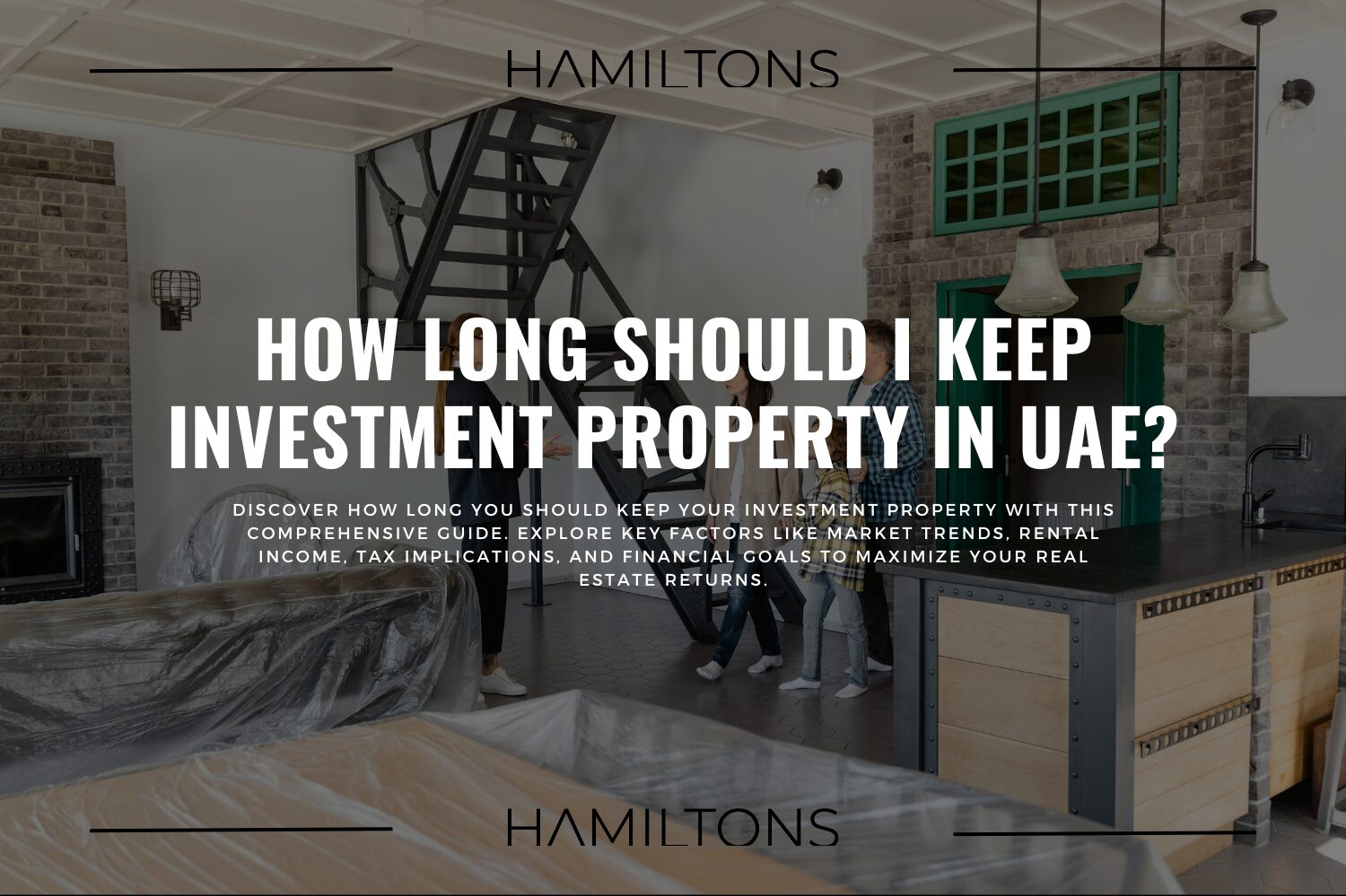Investing in real estate is one of the most effective ways to build long-term wealth, but the big question is: how long should you keep an investment property?
There’s no one-size-fits-all answer, as it depends on various factors including market trends, personal financial goals, and tax considerations.
In this article, we will dive into the key factors that determine the ideal holding period for investment properties and provide insights on how to make the best decision for your financial future.
Investing in property is one of the cornerstones of wealth-building strategies. Whether you’re a seasoned real estate investor or just starting out, one of the most important decisions you’ll face is determining how long you should keep your investment property.
Many factors come into play, such as market conditions, personal goals, taxes, and even emotional attachment. This article will break down the various factors that will help you decide the best time to sell or hold onto your property.
Understanding Investment Property
Before we get into how long to keep an investment property, it’s important to understand what qualifies as one. Investment property refers to real estate purchased for the purpose of earning returns through rental income, future resale, or both.
Types of Investment Properties
- Residential Properties: Single-family homes, condos, townhouses.
- Commercial Properties: Office spaces, retail stores, warehouses.
- Mixed-Use Properties: A combination of residential and commercial spaces.
Key Factors to Consider When Holding an Investment Property
Several key factors can determine how long you should keep your property. These include market appreciation, the rental income it generates, and any ongoing property management costs.
Market Appreciation
If property values in your area are increasing steadily, it may be worth holding onto your investment longer to take advantage of capital appreciation.
Rental Income
Properties that provide a consistent and growing stream of rental income are generally worth keeping, as they generate passive income and help you pay off the mortgage.
Property Management Costs
Ongoing costs like repairs, property management fees, and taxes can reduce your overall profits. If these costs are eating into your cash flow, it might be a sign to sell.
Interest Rates
When interest rates are low, it’s easier to refinance and maintain lower mortgage payments, making it more appealing to keep your property for the long term.
Investing in real estate in the UAE can be a lucrative venture, but it requires careful consideration. Location plays a crucial role in determining the potential for capital appreciation and rental income.
Areas with strong economic growth, proximity to amenities, and future developments are generally more desirable. The type of property you choose, such as apartments, villas, or commercial spaces, will impact factors like rental yield, maintenance costs, and capital appreciation.
Understanding the legal and regulatory framework is essential. This includes ownership rights for foreigners, lease agreements, and property taxes.
Financing options, such as mortgage rates, down payment requirements, and loan-to-value ratios, will also influence your investment decision.
It’s important to stay updated on market trends, including supply and demand, economic indicators, and government policies.
Property management is another critical aspect. You can choose to hire a professional management company or manage the property yourself.
Your exit strategy, whether it’s selling the property or generating rental income, should align with your investment goals.
By carefully considering these factors, you can make informed decisions and increase your chances of a successful real estate investment in the UAE. Consulting with local experts can provide valuable guidance and insights tailored to your specific needs.
The 5-Year Rule for Real Estate Investments
One commonly referenced rule in real estate is the 5-year rule, which suggests holding an investment property for at least five years to maximize your return.
The 5-year rule is a general guideline used in real estate investing to determine how long a property should be held before selling to potentially maximize returns.
While it’s not a hard and fast rule, it can be a helpful tool for making investment decisions.
Here’s how the 5-year rule works:
Holding Period: The basic idea is to hold an investment property for at least five years.
Tax Implications: In many jurisdictions, holding a property for more than five years can result in lower capital gains taxes.
Market Cycles: Real estate markets can fluctuate over time. Holding a property for five years or more can help you ride out market downturns and potentially benefit from long-term appreciation.
Rental Income: If you’re renting out your property, holding it for five years or longer allows you to collect rental income for a more extended period.
However, there are exceptions to the 5-year rule:
- Financial Need: If you need to sell your property due to financial hardship, the 5-year rule may not apply.
- Significant Market Changes: If the real estate market experiences a sudden and significant downturn, selling early might be a prudent decision.
- Investment Goals: If your investment goals change, such as needing to diversify your portfolio, selling earlier might be appropriate.
It’s important to note that the 5-year rule is a general guideline, and individual circumstances may vary. Factors such as your specific investment goals, market conditions, and tax implications should be carefully considered when making decisions about holding or selling a real estate property.
Additional Considerations:
Property Location: The location of your property can significantly impact its value over time. Properties in high-demand areas may appreciate more quickly than those in less desirable locations.
Property Type: The type of property you own can also influence its value and potential returns. For example, single-family homes may have different appreciation patterns than commercial properties.
Maintenance Costs: Be mindful of ongoing maintenance and repair costs, as these can impact your overall return on investment.
Benefits of the 5-Year Rule
- Allows property to appreciate in value.
- Helps avoid short-term capital gains tax.
- Provides time for rental income to stabilize.
Ultimately, the decision of how long to hold a real estate investment should be based on a combination of factors, including your financial goals, market conditions, and personal circumstances.
When Should You Sell an Investment Property?
There are several signs that it may be time to sell your investment property.
Personal Financial Goals
If your financial goals have changed, and you need liquidity for another investment or personal needs, selling could make sense.
Changes in the Local Real Estate Market
A declining real estate market or changes in local economic conditions might signal it’s time to sell.
The Importance of Capital Gains Tax
Capital gains tax is a critical factor in determining how long to keep a property.
Short-Term vs. Long-Term Capital Gains
Selling a property after less than a year results in short-term capital gains tax, which is usually higher than long-term rates. The longer you hold, the better your tax situation.
Market Timing vs. Long-Term Holding
Is it better to try and time the market or hold your property long-term?
Advantages of Long-Term Holding
- More tax benefits over time.
- Increased chance of property appreciation.
- Less risk of selling at a loss due to temporary market downturns.
Rental Income and Cash Flow Considerations
How Cash Flow Impacts Your Decision
A property with strong positive cash flow may be worth holding onto, especially if it covers your mortgage and other expenses.
Property Maintenance and Renovation Costs
Ongoing Maintenance
Properties require ongoing maintenance, which can reduce profitability. If these costs are getting too high, it might be worth considering a sale.
Tax Benefits of Holding Investment Property
Depreciation and Deductions
Owning investment property comes with tax benefits like depreciation and mortgage interest deductions, which can increase your overall profit.
Refinancing as an Option Instead of Selling
Refinancing is another option that allows you to extract equity from your property without selling it.
Benefits of Refinancing
- Access to lower interest rates.
- Cash-out equity for other investments.
Emotional Considerations Are You Attached to the Property?
Emotional attachment can sometimes cloud financial judgment. If you find yourself too attached to a property, it may hinder your ability to make the best decision.
Real Estate Investment and Retirement Planning
Investment properties can provide a stable income in retirement, but there may come a time when downsizing or liquidating them makes sense.
When to Seek Professional Advice from a Real Estate Advisor
Consulting with a professional can help you make an informed decision based on market conditions and personal financial goals.
Offer insights into the dynamic real estate landscape across the Emirates, particularly focusing on Sharjah.
UAE Real Estate Overview
The UAE’s real estate market is one of the most lucrative in the world, driven by rapid urbanization, a strong economy, and consistent demand from both local and international investors.
Dubai, Abu Dhabi, and Sharjah are key players in the UAE property market, each offering unique opportunities for different investor profiles.
Dubai: Known for its luxury developments, high-end residential and commercial properties, and robust rental yields, Dubai is ideal for investors looking for high capital appreciation.
Abu Dhabi: Offers a stable, government-backed real estate market with more long-term growth potential, particularly in residential and mixed-use projects.
Sharjah: An emerging player, increasingly attracting investors due to its affordable property prices and high rental returns, particularly in residential and industrial sectors.
Sharjah Real Estate Market Status
Sharjah’s real estate market is witnessing a steady rise in demand, driven by its affordability compared to Dubai and Abu Dhabi, and its appeal to families and middle-income investors.
Several new developments cater to residential, commercial, and industrial demands, especially with Sharjah’s strategic location and proximity to Dubai.
Residential Properties:
Sharjah offers a range of affordable housing options for both locals and expatriates. The market has seen a surge in demand for mid-range apartments and villas, especially in popular areas like Al Khan, Al Majaz, and Muwailih.
Commercial and Industrial Properties:
The emirate’s strategic location, connecting to the Northern Emirates and Dubai, makes it an attractive destination for industrial properties. The Al Saja’a Industrial Area and Hamriyah Free Zone are key hubs for business investments.
Regulatory Framework:
Sharjah’s real estate sector is governed by strong regulations aimed at protecting both investors and tenants. For example, long-term leases and affordable housing regulations are well-structured, making the emirate a safe and stable market for property investors.
Advice for Investment Property In Sharjah
Focus on High-Demand Areas:
Neighborhoods like Al Khan, Al Nahda, and Al Majaz offer strong rental yields, thanks to their proximity to Dubai and developed infrastructure. These areas are popular among families and working professionals.
Long-Term Residential Investments:
Sharjah’s residential property prices are relatively lower than Dubai, making it an attractive option for long-term investment. Villas and apartments in popular areas can offer rental yields of 6-8%, a strong return on investment.
Consider Upcoming Developments:
With multiple new projects being developed, investing in off-plan properties can offer significant capital appreciation over time. Sharjah Sustainable City and Aljada are two key developments promising good returns.
Tax Benefits:
Like the rest of the UAE, Sharjah offers tax-free real estate investment, allowing investors to maximize their profits without worrying about capital gains tax or income tax.
Plan for Long-Term Gains:
Sharjah’s real estate market offers steady, long-term appreciation rather than quick capital gains. Hold onto properties for at least five years to maximize returns, as the emirate continues to develop.
Sharjah’s real estate market is increasingly becoming a strong option for those seeking affordable yet profitable investments. With its strategic location, growing population, and new infrastructure projects, Sharjah is poised to offer great long-term investment opportunities in both residential and industrial sectors.
Deciding how long to keep an investment property depends on multiple factors, including your personal financial goals, market conditions, and tax considerations. By carefully weighing these factors, you can determine the best time to hold or sell your investment property to maximize your profits.
FAQs
How long should I keep an investment property to avoid capital gains tax?
To avoid short-term capital gains tax, it’s generally recommended to hold the property for more than a year. However, for the best tax advantages, holding for at least five years may be optimal.
Is it better to hold or flip investment properties?
It depends on your financial goals. Holding properties can generate steady rental income and long-term appreciation while flipping may offer quicker profits.
How can I increase the value of my investment property before selling?
You can increase value through renovations, upgrading appliances, or improving the property’s curb appeal.
What should I do if my property isn’t generating enough cash flow?
Consider refinancing, raising the rent, or cutting maintenance costs. If none of these solutions work, it might be time to sell.
How do interest rates impact when I should sell my investment property?
Higher interest rates make mortgages more expensive, which can decrease demand for properties. If interest rates are low, refinancing might be a better option than selling.



